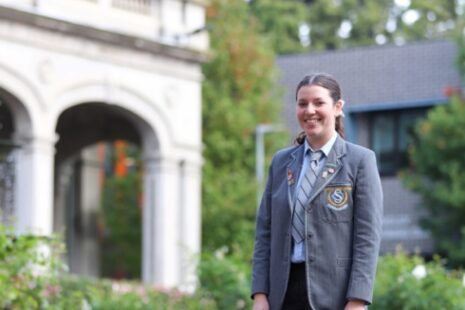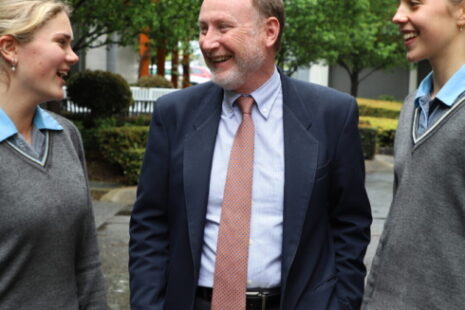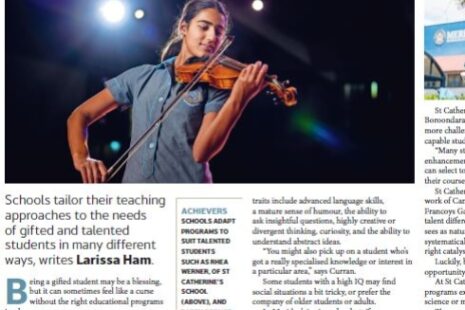Ignite the Curiosity in Every Child

Professor Ian Chubb, Australia’s Chief Scientist (2011–2016) describes a need to “ignite the curiosity in every child” and demands an educational re-focus to increase the number of students studying Mathematics and Science in Australia.
Professor Ian Chubb, Australia’s Chief Scientist (2011–2016) provided a provocative Keynote Address at the National Education Forum this week in Canberra. He described a need to “ignite the curiosity in every child” and demanded an educational re-focus to increase the number of students studying Mathematics and Science. In 2015/16 the Australian Government launched the National Innovation Science Agenda, recognising the centrality of the STEM/TIDE (Science, Technology, Engineering and Mathematics) subjects in ensuring national prosperity well into the 21st Century.
A major objective of the National Agenda is to increase opportunities for women in the STEM career areas; the Agenda further stated:
Only one in four IT graduates and fewer than one in 10 Engineering graduates are women. Additionally, women occupy fewer than one in five senior research positions in Australian universities and research institutes, and around one quarter of the STEM workforce overall. We need a concerted, national effort to overcome the cultural, institutional and organisational factors that discourage girls and women from studying STEM, and that limit their opportunities to pursue STEM careers.
Over the next five years, employment is predicted to increase in professional, scientific and technical services by 14% and in health care by almost 20%. The ABS has estimated STEM-related jobs, such as ICT professionals and engineers, have grown at about 1.5 times the rate of other jobs in recent years. Google Australia’s Head of Computer Science Outreach, Sally-Ann Williams, said women comprised only 3% of applications to study IT at university, “yet we know that 75% of all future jobs will require STEM skills and the vast majority of them are technical skills.”
Echoing Professor Chubb’s call for action and deliberation of the Strategy was an article in The Australian last week – Girls Barking up the Wrong Tree (March 10, Natasha Bita) – highlighting that girls outsmart boys in Mathematics and Science but are shunning the “money-spinning subjects at school.” After tracking 58,000 Victorian students between Years 7 and 12, the University of Melbourne discovered boys are five times more likely than girls to study Physics and nine times more likely to study Information Technology for the Victorian Certificate of Education. The study found girls who were good at Mathematics still tend to favour Biology and Human Development, subjects that can launch a career in allied health but limiting to other STEM industries.
The study revealed that despite shunning Science studies, girls outperformed boys in every STEM subject in Senior school. In essence, girls should be encouraged to study Mathematics, Physics and IT, even if they think they are not good enough. In every field, the girls performed better, on average, than the boys.
At St Catherine’s, our STEM agenda in our Junior School has included the development of the 2016 STEM Morning program, the introduction of a specific classroom-based STEM subject for Year 3 students and the inclusion of a now well-established CREST (CREatvity in Science and Technology) program across all Barbreck classes. The CREST Program is written and supported by our Head of Science, Ms Vanessa Jackson-McRae. Buy cheap high quality generic Cialis from online pharmacies on this page http://www.trendingdownward.com/cialis-tadalafil/, prices will surprise you and for big packages you will get bonuses and free shipping.
In the Senior School, the development of the TIDE curriculum at Years 7 and 8 (Technology, Innovation, Design and Engineering) last year introduced girls to coding in 2015 and this year girls are participating in the Solar Boat Challenge. These subjects will be further extended in Years 9 and 10 Electives next year with offerings including advanced Mathematics and Science programs.
Of our Senior graduates last year, several girls were offered placements at Monash and Melbourne Universities with scholarships specifically designed to encourage girls into IT, Computer Science and Engineering courses. Interested Years 11 and 12 students should seek the advice of our careers practitioner, Mrs Pauline van der Poel, for further information about tertiary scholarship opportunities. The Mathematics Faculty also encourage students to continue studying through to VCE Mathematics and we were delighted to achieve a student with a perfect Study Score in Specialist Mathematics last year.





